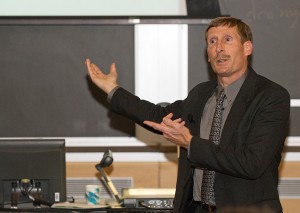
When Charles Duelfer (’74 MA, history) was sent to Iraq in 2004 by President George W. Bush to find out why the administration had been wrong about Iraqi weapons of mass destruction, he was assured by his old friend George Tenet, CIA director, that they wanted “just the truth.”
But Duelfer responded, “How deep do you want to go?”
“There’s always another explanation,” the College of Liberal Arts and Sciences alumnus told faculty and students at the Storrs campus during a talk he gave as part of his national book tour.
Duelfer’s new book, Hide and Seek: The Search for Truth in Iraq, examines how Iraq and the U.S. twice misled each other into war.
Both sides understood information only in light of hypotheses that fit their own assumptions, he said.
“We thought Saddam Hussein would be crazy not to have weapons of mass destruction,” he said. “Saddam missed the import of 9-11.”
He said that critical thinking might have raised the questions: “What are your assumptions? What are Saddam’s? Can you see something that you don’t have a word for?”
Duelfer, an intelligence officer and former deputy chairman of UNSCOM, the UN Special Commission on weapons inspection in Iraq after the first Gulf War, said his mission in 2004 was not to find weapons of mass destruction but to find the truth.
He also wanted to learn how Saddam Hussein – whom he had debriefed after he was captured – and his regime had operated.
“It was an opportunity to record things that would not exist again.” And that, he says, is where his background as a student of history was helpful.
The report of his Iraq Survey Group in the fall of 2004, often called the Duelfer Report, was described by the Washington Post as contradicting nearly every pre-war assertion made by top Bush administration officials about Iraq.
The administration’s most costly mistake was not that it was wrong about weapons of mass destruction, but that it elected not to take advantage of the CIA’s understanding and judgment about Iraq in its post-Saddam planning, Duelfer said.
CIA involvement was blocked, and decisions to fire Iraqi Army officers and treat Ba’ath party members as “the enemy” caused huge problems, he said.
Today, “we’re in a fairly decent place” in Iraq, he said. “But we could have been there four years ago. We paid a huge price.”


